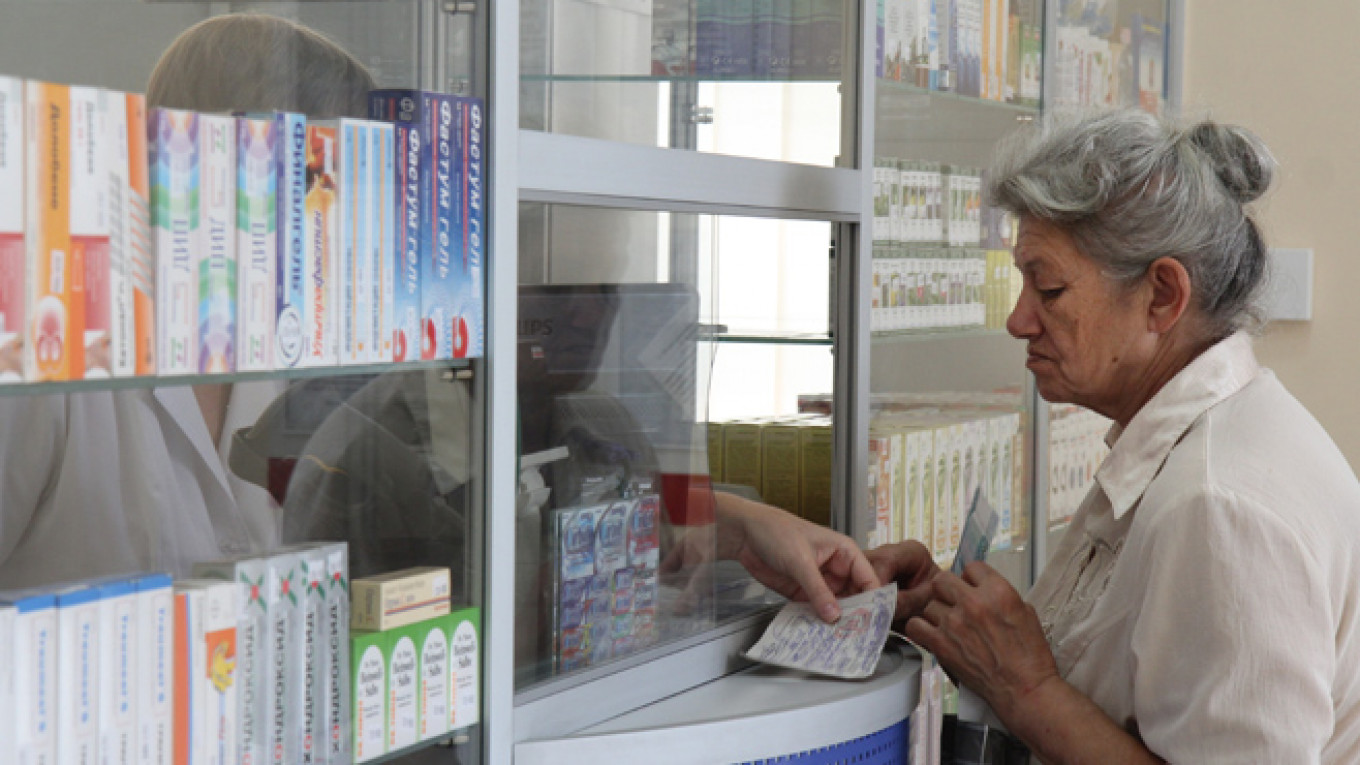"Pharmacies have become like jewelry shops," complained a man during this year's annual phone-in with the Russian president. Vladimir Putin's response was to reassure the man that his government planned to control rising medicine prices. When asked whether he used foreign or Russian-made medication, the president replied that he tried to steer clear of medicine altogether "by leading a healthy lifestyle."
While clean-living may work in the Kremlin, basic health care is becoming less accessible to ordinary Russians. Medicine sales have fallen for the first time in Russia since 2008: Analysts recorded a 10 percent drop in drug sales in the first quarter of this year. During a severe economic crisis, a growing number of Russians can no longer afford to buy medicine.
The figure is the latest indicator of falling living standards in Russia, and has alarmed some experts, who say that medicine is the last commodity for people to cut back on. Writing in Slon magazine, Yevgeny Gontmackher said more and more Russians are turning to home remedies to cure illnesses.
Russia's deteriorating health care system will also have long-term effects. Staff cuts in hospitals and growing pressure on doctors mean an increasing number of Russians, especially in remote regions, are losing access to free medicine.
"People are cutting back on everything and we see no sign of this tendency reversing," says Marina Krasilnikova, an economist at the Moscow-based Levada Center pollster.
While medicine use offers one worrying clue as to the falling quality of life in Russia, Krasilnikova says food sales are most accurate indicators in falling living standards. This week, the ACRA credit rating agency found that Russians are moving away from vegetables, fruit and fish and buying more bread, dairy and potatoes. Food consumption overall had decreased 4.2 percent, the agency reported, with a greater fall offset by a move away from expensive foodstuffs. In mid-May, Russian market research company Romir found that 90 percent of Russians have gone into saving mode, while 43 out of 100 were cutting their food budget.
Krasilnikova says medicine sales show that life is about to become much harder for families with chronically ill family members and pensioners.
"The prices just keep soaring," says Irina Kuninskaya, a woman buying prescription drugs for her 78-year-old mother in a Moscow pharmacy. "With my mother's miserable pension and my income falling, we don't know how to feed the family anymore," she says.
The drugs Kuninskaya bought are foreign-made. She expressed hope that Russia would soon be able to produce affordable medicine of the same quality.
The Russian government has tried to boost self-sufficiency in drug production by limiting imports of foreign substances for pharmaceutical companies. Moscow introduced new laws last year forcing Russian companies to import less from European companies in a bid to increase the amount of Russian-made drugs on the market from 30 percent to 50 percent by 2020.
While there may be more domestically produced drugs in Russian pharmacies, many prices are, in fact, rising faster than those of imported medicine. According to a study by Moscow's Higher School of Economics, the price of Russian-made essential medicines rose by 28.9 percent in 2015, compared to just 4.9 percent for imported drugs. In that same year, prices for life-saving medicine, whose prices are regulated by the government, rose by as much as 32 percent.
The Kremlin has said it will crack down on pharmaceutical businesses not selling products at the regulated price. Starting this week, pharmacies not adhering to these rules could be shut down for up to 90 days.
But Russian pharmaceutical companies say they cannot compete in a foreign-dominated market. The crash of the ruble meant foreign substances used in drug production became more expensive, further straining Russian companies. During the call-in with Putin, the owner of a pharmaceutical company from Samara asked the Russian president to scrap government price restrictions. "We are forced to sell goods at the same price as six years ago," he said.
Pensioners are perhaps the group most affected by increasingly expensive medicine in Russia. This year, the government increased pensions by only 4 percent, set against double-digit inflation in food and medicine.
The senior demographic's struggle was caught on camera when Prime Minister Dmitry Medvedev was confronted by angry Crimean pensioners demanding higher pensions. Medvedev's reply soon became a nationwide meme, epitomizing Russia's current crisis. "There's no money, but you take care," he said.
Contact the author at [email protected]. Follow the author on Twitter at @olacicho
A Message from The Moscow Times:
Dear readers,
We are facing unprecedented challenges. Russia's Prosecutor General's Office has designated The Moscow Times as an "undesirable" organization, criminalizing our work and putting our staff at risk of prosecution. This follows our earlier unjust labeling as a "foreign agent."
These actions are direct attempts to silence independent journalism in Russia. The authorities claim our work "discredits the decisions of the Russian leadership." We see things differently: we strive to provide accurate, unbiased reporting on Russia.
We, the journalists of The Moscow Times, refuse to be silenced. But to continue our work, we need your help.
Your support, no matter how small, makes a world of difference. If you can, please support us monthly starting from just $2. It's quick to set up, and every contribution makes a significant impact.
By supporting The Moscow Times, you're defending open, independent journalism in the face of repression. Thank you for standing with us.
Remind me later.


